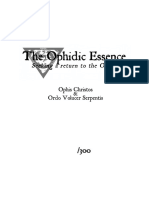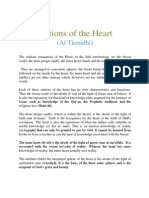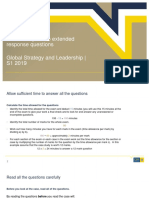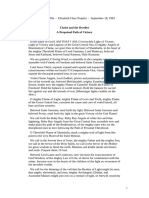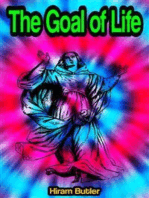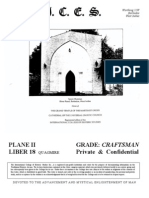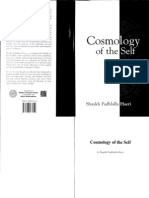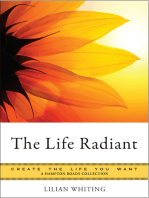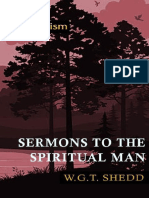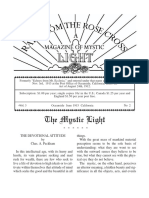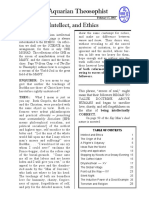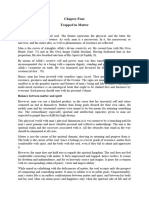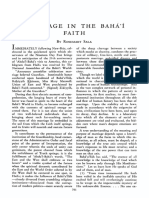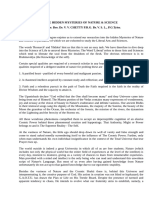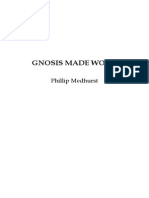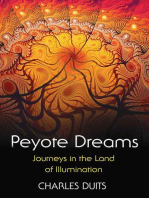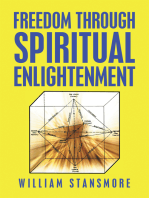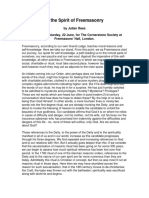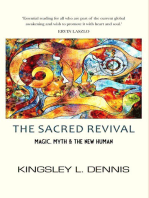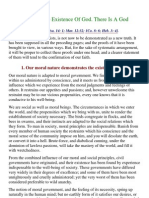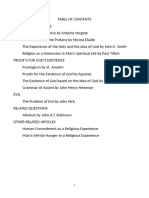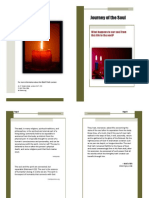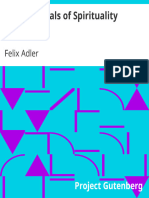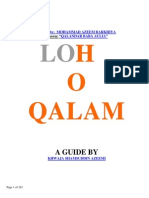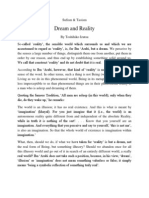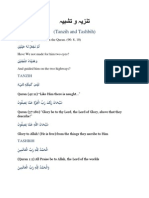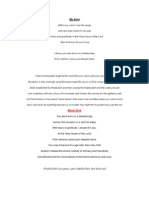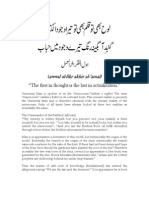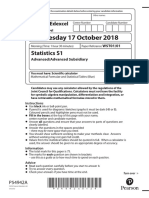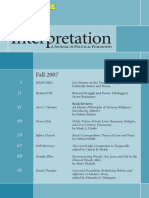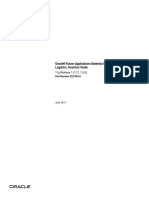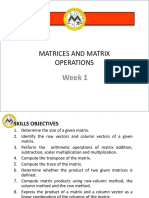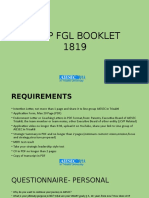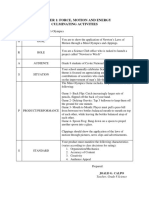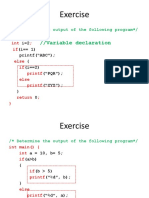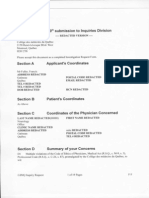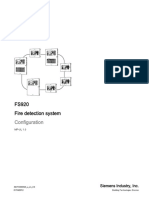Editorial: On Volition and Desire: by M. Ali Lakhani
Editorial: On Volition and Desire: by M. Ali Lakhani
Uploaded by
Mansoor AhmadCopyright:
Available Formats
Editorial: On Volition and Desire: by M. Ali Lakhani
Editorial: On Volition and Desire: by M. Ali Lakhani
Uploaded by
Mansoor AhmadOriginal Title
Copyright
Available Formats
Share this document
Did you find this document useful?
Is this content inappropriate?
Copyright:
Available Formats
Editorial: On Volition and Desire: by M. Ali Lakhani
Editorial: On Volition and Desire: by M. Ali Lakhani
Uploaded by
Mansoor AhmadCopyright:
Available Formats
Editorial: On Volition and Desire
By M. Ali Lakhani
En la sua volontade nostra pace. (In His Will is our Peace.)
Dante, Paradiso, Canto III, line 85
Desire only God, and your heart will be satisfied.
St. Augustine
umankind has been endowed with the gift of free will, and also with a sense of the Sacred, an inclination toward transcendent Beauty. According to Tradition, it is by the divine Will and Fiat that we exist, in accordance with Our Makers creative Nature, and it is by His Command that we shall return to Him, to be judged according to His Justice and Mercy. But while we exist on this earth, we are entrusted with the gift of free will, a responsibility that carries with it not only the power to act according to our own individual whims and desires but also the duciary obligation to respond to the sense of the Sacred within us, in conformity with the beauty and goodness of our inner nature, and in so doing to nd our inner Peace. The purpose of volition is to direct our soul towards Beauty, so that we may be drawn by its gravitational pull, and to resist the false desires of the World, the Flesh, and the Devil, those transient and outward attractions that distract and seduce our refractory will from our impulse for the Sacred, for the eternal and inward Beauty imprinted within the Spirit which is the font of the animating soul. The fulllment of this
SACRED WEB 30 9
Editorial: On Volition and Desire M. Ali Lakhani
purpose is the Divine Trust that is incumbent on each soul according to the degree of its intelligence. Tradition teaches us that heaven and hell are both accessible within us, the former by conforming our souls to the divine Will, and the latter through the consequence of pursuing our individual lusts and vain desires. The choice is our own. In the words of Jacob Boehme, ...the free will may reach to which it pleases: both gates stand open to him. But this choice is not a burden without the blessing of divine guidance. Despite the privative inuences of existence, we are guided by our innate intelligence, by its capability of discerning the Sacred within its own Goodness and in the Beauty that surrounds us. The reminders of our spiritual patrimony exist rst within the microcosm of our primordial nature and its inherent sense of the Sacred which enables it to witness the core of Being (thereby mirroring the pre-existential witnessing which was the basis of the souls covenant with God in the Quranic teaching of the Covenant of Alast, see The Heights, 7:172), and second within the macrocosm of the theophanic signs that reect this Beauty. Thus we are taught to know ourselves and also to see God in nature.The outer is, to discerning eyes, the mirror of the inner. So, for example, the Quran states:
It is He who sends down water from the sky.From it you drink and from it come the shrubs among which you graze your herds.And by it He makes crops grow for you and olives and dates and grapes and fruit of every kind.Therein is certainly a sign in that for people who reflect.He has made the night and the day subservient to you, and the sun, the moon and the stars, all subject to His command.Therein are certainly signs in that for people who use their intellect. And also, the things of varying colors He has created for you in the earth. There is certainly a sign in that for people who pay heed. It is He who made the sea subservient to you so that you can eat fresh flesh from it and bring out from it ornaments to wear.And you see the ships cleaving through it so that you can seek His bounty, and so that perhaps you may show thanks.He cast firmly embedded mountains on the earth so it would not move under you, and rivers, pathways, and landmarks so that perhaps you might be guided.And they are guided by the stars.Is He Who creates like him who does not create? O will you not pay heed? (The Bee, 16:10-17)
And the Psalms state:
The heavens declare the glory of God; the skies proclaim the work of his hands. Day after day they pour forth speech; night after night they display knowledge. There is no speech or language where their voice is not heard. Their voice goes out into all the earth, their words to the ends of the world which is like a bridegroom coming forth from his pavilion, like a champion rejoicing to run his course. It rises at one end of the heavens and makes its circuit to the other; nothing is hidden from its heat. (Psalm, 19:1-6)
10
SACRED WEB 30
M. Ali Lakhani Editorial: On Volition and Desire
As the theophany reveals itself to us so we are guided according to our propensity to discern the mirror of its Beauty within us.This propensity is a matter of our intellectual receptivity, our spiritual intelligence or faith, which can either be open to the eternal verities of our primordial nature or be veiled from them, both by the beguilements of the material world and by the vainglories of the deluded self. In the former case, the reied world veils us from Beauty and deceives the intelligence, preventing it from seeing things aright, while in the latter, the reied self is the veil that hardens its heart and intentionally covers up the spirit, with the full complicity of its egoic volition, against its guiding intelligence.The celebrated Opening Verse (al-Fatiha) of the Quran thus distinguishes between those who have gone astray (by failing to see things aright) and those cursed ones (who willfully assert themselves against God). Both these tendencies, toward beguilement of the self by the life of the present and its glitter (Hud, 11:15) and toward the pitting of the Luciferian self against God (And Satan whispered unto him and said, O Adam, shall I show thee the Tree of Immortality and a kingdom that fadeth not away?, Taha, 20:120), are much on display in the world we live in, and we must be vigilant to guard against these tendencies given the conditions of our times.
Cc
The modern world poses a great peril for the soul. According to the great faith traditions, we are living in the End Times in which traditional bulwarks have eroded and, in many cases, disappeared altogether. Modern societies are increasingly secularized, pushing the boundaries of religion further into the private sphere. We can see this erosion occurring in all areas through the loss of verticality and the leveling of society to its outer elements. Primordial norms rooted in theocentric metaphysical archetypes of divine revelation, accessible through initiation and intellection, are being denied legitimacy by modernist world-views and schools of thought that privilege anthropocentric norms lacking metaphysical objectivity. Traditional structures of hierarchy and authority are being supplanted by horizontalized notions of individual rights and freedoms, and by norms and values based on the relativist criteria of subjective preferences fueled by fashion or consumerism, or those based on the quantitative criteria of
SACRED WEB 30 11
Editorial: On Volition and Desire M. Ali Lakhani
scientic materialism, which privileges mechanistic and computational analyses over qualitative intellectual perceptions and values.These trends are evident, for example, in the ascendancy of scientistic atheism and its assertion of the so-called God delusion, in modernist challenges to traditional values about sexual freedom, gay marriage, and gender roles, and in the pervasive inuence of scientism and neo-Darwinism within elds ranging from economic planning to health planning to literary criticism. Modernism has even directly inuenced religion in diverse ways including evolutionist theology, syncretist ecumenism, New-Ageism, and fundamentalism, to cite only a few examples. As the world becomes reduced to its surfaces, the qualitative elements of human purpose and value and of spiritual well-being become relegated in importance to quantitative elements such as material comforts and the outer pleasures of sensory gratication and stimulation. The inward contemplativeness of the subject gives way to subjectivism, intellectual intuitions to discursive reasoning, and empathetic virtue to indulgent sentimentalism. The psyche dominates the self and is conated with the spirit, a trend that is evident in various forms of pseudo-religion. The loss of awareness of true metaphysical archetypes creates at the individual level an appetite for virtual reality and for surrealistic fantasy, and at the social level it breeds monstrous utopian delusions. So too unbridled sensory passions, no longer tethered by their guiding intellect, make the soul vulnerable to infernal inuences that manifest in myriad forms of hedonism. In this milieu, the distractions of the material world and of the vain self can easily overwhelm our senses and cause us to lose our grip on reality. More than ever, it becomes important to combat these centrifugal inuences by reorienting ourselves to our spiritual Center, by rediscovering the sense of the Sacred within our souls, by seeking its presence in the Beauty of the unfolding theophany around and within us, and by conforming our will to our deeper purpose: to become vessels of the divine Light.
Cc
Because we exist, we experience privation. Our desires represent our longing for connection with transcendence, for our apartness to be replaced by a sense of wholeness, for the emptiness within us to
12 SACRED WEB 30
M. Ali Lakhani Editorial: On Volition and Desire
be lled. In reality, as tradition teaches, we are created from a single soul, and therefore we have a common metaphysical origin and are connected by an intrinsic harmony, whose core or spiritual Center is our innermost being. Viewed in this light, existence is Beauty. It is the effulgent radiance of this Center, which we recognize as the Sacred. Like the reed-pipe in the opening stanza of Rumis Mathnavi, we are all exiles seeking to be united with the spiritual reed-bed which is our Origin. It is by sublimating our worldly desires to the Sacred, by being drawn by its Beauty, that we can attain the wholeness that we seek. Yet we must empty ourselves of ourselves in order to be lled. In the words of T.S. Eliot, In order to possess what you do not possess / You must go by the way of dispossession. / In order to arrive at what you are not / You must go through the way in which you are not. For the desire for the possession of phenomenal things, and the quest to gratify the phenomenal self, is a form of ignorancewe ignore that which is substantial. Ananda K. Coomaraswamy observes:
...the cause of all wanting is ignorance (avidya)for we ignore that the objects of our desire can never be possessed in any real sense of the word, ignore that even when we have got what we want, we still want to keep it and are still in want. The ignorance meant is of things as they really are, and the consequent attribution of substantiality to what is merely phenomenal; the seeing of Self in what is not-Self.
It is only by detaching ourselves from the lures of the peripheral that we can gain access to the inner sanctum of the Sacred.As Christ taught, we must submit to Gods Will (see Mark 14:36:Father,...take away this cup from me: nevertheless not what I will, but what thou wilt). And as the Buddha taught (one of his principal teachings being that false desires are the root of all suffering), we must re-educate our desires by awakening our souls to transcendence. By opening ourselves to God, He opens to our souls. By turning towards God, He turns to us. Hence it is written,Turn ye unto me,...and I will turn to you (Zechariah, 1:3) and Remember Me and I will remember you (Quran, The Cow, 2:152). It is through the inner self-restraint of ascesis and conformity of our self-will to our primordial nature that we can open ourselves up to our transcendent source and end. It is through reconstitutive prayer and contemplation upon the eternal verities evidenced in our hearts and in nature, that we can polish the mirror of the soul and thereby reect the inner Light that we possess as Lamps of God.
SACRED WEB 30 13
Editorial: On Volition and Desire M. Ali Lakhani
While we cannot necessarily change the way of the world, we can by the Grace of God change ourselvesand by doing so, we can thereby change our own world. But this requires us to reorient ourselves radically towards the Face of God, to discern, with eyes of faith, the underlying harmony of the unfolding theophany and our role within it. It requires us to open hearts to the intrinsic goodness of creation, to see it not merely in its separateness but in its integrated wholeness, as holy in each of its particulars, and thereby to perceive our own intrinsic goodness too.And by this reorientation, by this witnessing and perception, we can hope by His Grace to redirect ourselves towards His ends, to efface ourselves within His Face and to conform our will to His Will. The true object of our volition is virtue, and of our desire is union with our Beloved. As our intellects incline to Truth, so our wills incline to Goodness, and our hearts to Beauty. It is in the ways of Goodness and virtue that we must bend our wills, and be drawn by our desire for the Beauty of the sacred presence of our Beloved. It is in so doing that we can hope to be transformed. As Ruysbroek taught, The measure of your holiness is proportionate to the goodness of your will, and we cannot attain to our higher purpose on this earth unless we have sublimated our merely human wills and desires to our transcendent Spirit. It is by conforming our desires to our innate Goodness, that we can hope to become a mirror of Beauty and so attain to the Peace that is everlasting.
14
SACRED WEB 30
You might also like
- Soulcraft: Crossing into the Mysteries of Nature and PsycheFrom EverandSoulcraft: Crossing into the Mysteries of Nature and PsycheRating: 4 out of 5 stars4/5 (36)
- W Sears-The Baby Book RevisedThe Baby Book Revis Edition Everything YDocument1,611 pagesW Sears-The Baby Book RevisedThe Baby Book Revis Edition Everything Ymorhy360100% (2)
- The Ophidic Essence PDFDocument82 pagesThe Ophidic Essence PDFAzaoth Alexander100% (12)
- The Name and The NamedDocument285 pagesThe Name and The NamedMansoor Ahmad100% (2)
- Wicca - Planning and Designing RitualDocument22 pagesWicca - Planning and Designing RitualAndrés Jimenez100% (2)
- The Etymology of Belief.Document2 pagesThe Etymology of Belief.Mansoor Ahmad100% (1)
- Stations of The HeartDocument2 pagesStations of The HeartMansoor Ahmad100% (2)
- How To Respond To Extended Response Questions Global Strategy and Leadership - S1 2019Document11 pagesHow To Respond To Extended Response Questions Global Strategy and Leadership - S1 2019kennyeffectNo ratings yet
- Planet Hoppers 13Document7 pagesPlanet Hoppers 13SW-FanNo ratings yet
- SmartSeis ST ES-3000QuickStartManual Rev LDocument19 pagesSmartSeis ST ES-3000QuickStartManual Rev LAngel Nahun RiveraNo ratings yet
- Polish For The HeartDocument3 pagesPolish For The HeartExtraDriveNo ratings yet
- 1 PERLAS DE SABIDURIA cristo y el morador INGLES AND SPANISHDocument50 pages1 PERLAS DE SABIDURIA cristo y el morador INGLES AND SPANISHtslcordoba1No ratings yet
- Borderlands of The SpiritDocument218 pagesBorderlands of The Spiritcrimsonskies911100% (1)
- Echoes of a Vision of Paradise, a Synopsis: If You Cannot Remember, You Will ReturnFrom EverandEchoes of a Vision of Paradise, a Synopsis: If You Cannot Remember, You Will ReturnNo ratings yet
- I. C. E. S.: Plane Ii Grade: Craftsman Liber 18 Private & ConfidentialDocument22 pagesI. C. E. S.: Plane Ii Grade: Craftsman Liber 18 Private & ConfidentialIba Orunmila100% (1)
- Cosmology of The Self-Shaykh Fadhlalla HaeriDocument33 pagesCosmology of The Self-Shaykh Fadhlalla HaerikatopatNo ratings yet
- The Life Radiant: Create the Life You Want, A Hampton Roads CollectionFrom EverandThe Life Radiant: Create the Life You Want, A Hampton Roads CollectionNo ratings yet
- Sermons To The Spiritual Man - W. G. T. SheddDocument351 pagesSermons To The Spiritual Man - W. G. T. SheddjosiasNo ratings yet
- Astral Light Attem 0000 Ni ZiDocument198 pagesAstral Light Attem 0000 Ni Ziklc44masterNo ratings yet
- 1915 06 Jun Rays From The Rose CrossDocument62 pages1915 06 Jun Rays From The Rose Cross7h09800hNo ratings yet
- Aquarian Theospophist Vol-2-4Document28 pagesAquarian Theospophist Vol-2-4JohnVNo ratings yet
- Romano Guardini and The End of ModernityDocument2 pagesRomano Guardini and The End of ModernityThaddeusKozinskiNo ratings yet
- Between Heaven and Earth (Francisco Candido Xavier - Andre Luiz)Document222 pagesBetween Heaven and Earth (Francisco Candido Xavier - Andre Luiz)Alexandre Rafael DistefanoNo ratings yet
- Ascended Masters - El MoryaDocument68 pagesAscended Masters - El Moryamastersascended100% (1)
- 4 Trapped in Matter Article December 2019Document6 pages4 Trapped in Matter Article December 2019Spahic OmerNo ratings yet
- The Shire: Glendalf's Guide to Cultivating Your Future SelfFrom EverandThe Shire: Glendalf's Guide to Cultivating Your Future SelfNo ratings yet
- Vedānta vs. Śaiva TantraDocument12 pagesVedānta vs. Śaiva TantraChristopher Wallis50% (2)
- The Bahai World Vol07 1936 1938 788 795Document8 pagesThe Bahai World Vol07 1936 1938 788 795mNo ratings yet
- The Ophidic Essence PDFDocument82 pagesThe Ophidic Essence PDFwcbx52zbhgNo ratings yet
- Renewing the Process of Creation: A Jewish Integration of Science and SpiritFrom EverandRenewing the Process of Creation: A Jewish Integration of Science and SpiritNo ratings yet
- The Hidden Mysteries of Nature & Science by Wor. Bro. Dr. V. V. CHETTY P.R.G. Br. V. S. L., P.G.TyierDocument3 pagesThe Hidden Mysteries of Nature & Science by Wor. Bro. Dr. V. V. CHETTY P.R.G. Br. V. S. L., P.G.Tyierscribe.ezraNo ratings yet
- Blow Dantesinferno 1884Document19 pagesBlow Dantesinferno 1884jbeach27No ratings yet
- The Hour of God and Other WritingsDocument398 pagesThe Hour of God and Other WritingskgrdNo ratings yet
- Gnosis Made WordDocument38 pagesGnosis Made WordHarry KossuthNo ratings yet
- On The Great Work of The EcclesiaDocument4 pagesOn The Great Work of The EcclesiaAzam-Savaşçı Anderson Mohammad100% (1)
- Eschatology: End of Time or Freedom From Time: Eschatological Teaching of The ChurchDocument3 pagesEschatology: End of Time or Freedom From Time: Eschatological Teaching of The ChurchDan SgartaNo ratings yet
- Truth Hurts But The Truth Heals: Urban ProphecyFrom EverandTruth Hurts But The Truth Heals: Urban ProphecyNo ratings yet
- Julian Rees - in - The - Spirit - of - FreemasonryDocument7 pagesJulian Rees - in - The - Spirit - of - FreemasonryDesire SaccalNo ratings yet
- I. C. E. S.: Plane Ii Grade: Craftsman Liber 20 Private & ConfidentialDocument25 pagesI. C. E. S.: Plane Ii Grade: Craftsman Liber 20 Private & ConfidentialIba Orunmila100% (1)
- The Essentials of Spirituality 2Document61 pagesThe Essentials of Spirituality 2kalekwabarazamaulidiNo ratings yet
- Chapter 1. - Existence of God. There Is A GodDocument5 pagesChapter 1. - Existence of God. There Is A Godtruthwarrior007No ratings yet
- The Evolution of Religion, Volume 2 (Barnes & Noble Digital Library)From EverandThe Evolution of Religion, Volume 2 (Barnes & Noble Digital Library)No ratings yet
- Encounter CompleteDocument66 pagesEncounter Completemarklouie budiasNo ratings yet
- Journey of The Soul (All Religions)Document6 pagesJourney of The Soul (All Religions)AnoushaNo ratings yet
- Aiwass, Maat and The New AeonDocument11 pagesAiwass, Maat and The New AeonGnosticLucifer100% (2)
- Los fundamentos de la espiritualidad Felix AdlerDocument63 pagesLos fundamentos de la espiritualidad Felix AdlervademeditarNo ratings yet
- How Do We Enter The HeartDocument3 pagesHow Do We Enter The HeartMansoor Ahmad100% (1)
- Islam and The Betrayal of TraditionDocument32 pagesIslam and The Betrayal of TraditionMansoor AhmadNo ratings yet
- Qalandar Baba AuliaDocument163 pagesQalandar Baba AuliaMansoor AhmadNo ratings yet
- Dream and RealityDocument15 pagesDream and RealityMansoor AhmadNo ratings yet
- Ya AllahDocument1 pageYa AllahMansoor AhmadNo ratings yet
- Al MawaaizhDocument289 pagesAl MawaaizhMansoor AhmadNo ratings yet
- ! Oh The Satisfaction of Life and Heart What Sort of Pilgrimage Is This JourneyDocument2 pages! Oh The Satisfaction of Life and Heart What Sort of Pilgrimage Is This JourneyMansoor AhmadNo ratings yet
- تنزیہ و تشبیہDocument2 pagesتنزیہ و تشبیہMansoor AhmadNo ratings yet
- Iqbal and The Problem of EvilDocument21 pagesIqbal and The Problem of EvilMansoor AhmadNo ratings yet
- Ibrahim Is The Melody and Mohammad The Lyrics of The Song My Heart SingsDocument1 pageIbrahim Is The Melody and Mohammad The Lyrics of The Song My Heart SingsMansoor AhmadNo ratings yet
- حدیث جبریلDocument9 pagesحدیث جبریلMansoor AhmadNo ratings yet
- Awalul Fikar Akhirul AmalDocument2 pagesAwalul Fikar Akhirul AmalMansoor AhmadNo ratings yet
- CheckmateDocument1 pageCheckmateMansoor AhmadNo ratings yet
- Event Brochure Final DraftDocument28 pagesEvent Brochure Final DrafthemanathleathertechnologistNo ratings yet
- S1 Oct 18 QPDocument24 pagesS1 Oct 18 QPmaya 1DNo ratings yet
- Part 5 Test 2Document3 pagesPart 5 Test 2TIEN NGUYEN HOANG THUYNo ratings yet
- Ansoff's Matrix For DaburDocument10 pagesAnsoff's Matrix For DaburNikhil AdhyeNo ratings yet
- My ABA GlossaryDocument4 pagesMy ABA GlossaryFlor de Liz100% (2)
- Modul Bahasa Inggeris UpsrDocument786 pagesModul Bahasa Inggeris UpsrRafie Rosle100% (1)
- If You Want To Build A Ship, Don't Drum Up People To Gather Wood, Saw It and Nail The Planks Together. Instead, Build in Them A Passionate Desire For The SeaDocument20 pagesIf You Want To Build A Ship, Don't Drum Up People To Gather Wood, Saw It and Nail The Planks Together. Instead, Build in Them A Passionate Desire For The SeaNajad SalahudeenNo ratings yet
- Interpretation - Political Philosophy Journal - Heidegger's Secret ResistanceDocument104 pagesInterpretation - Political Philosophy Journal - Heidegger's Secret ResistanceVictor CantuárioNo ratings yet
- Fusion InventoryDocument51 pagesFusion Inventoryvenvimal1100% (1)
- Academic Librarians and Their Social Media Presence PDFDocument13 pagesAcademic Librarians and Their Social Media Presence PDFMihaela PopescuNo ratings yet
- MSD Thesis StudioDocument6 pagesMSD Thesis Studioashleyfishererie100% (2)
- Drawing View OverlayDocument9 pagesDrawing View OverlayMaurijones J. de AlbuquerqueNo ratings yet
- EDUC 204 EXAM Jomielyn C. RicafortDocument5 pagesEDUC 204 EXAM Jomielyn C. RicafortjomielynricafortNo ratings yet
- Math 15-1 Week 1Document26 pagesMath 15-1 Week 1Ian William De Las AlasNo ratings yet
- Iess 101Document48 pagesIess 101Tejvir SinghNo ratings yet
- Barbie Handout NataliaDocument2 pagesBarbie Handout NataliaEmilio Barajas RiveraNo ratings yet
- LCVP FGL BookletDocument6 pagesLCVP FGL Booklettm.aiesecusaktiNo ratings yet
- UG NON-NEET - B.TECH. FINAL MERIT LIST - PUDUCHERRY U.T. - OVERALL - CompressedDocument79 pagesUG NON-NEET - B.TECH. FINAL MERIT LIST - PUDUCHERRY U.T. - OVERALL - CompressedFathimaNo ratings yet
- G8 Performance Tasks PDFDocument4 pagesG8 Performance Tasks PDFmarife gupaalNo ratings yet
- Class - 4 Ethical Issues in Business ResearchDocument15 pagesClass - 4 Ethical Issues in Business ResearchNitesh PanchNo ratings yet
- 1 DecisionControlDocument25 pages1 DecisionControlMeet MunjaparaNo ratings yet
- Exhibit A PDFDocument19 pagesExhibit A PDFdecsushiNo ratings yet
- Policies For PDF ContentDocument3 pagesPolicies For PDF Contentvijay123inNo ratings yet
- Empires of The Void Rules v5Document12 pagesEmpires of The Void Rules v5Celtis24No ratings yet
- A6V10333423 Configuration Siemens CerberusDocument242 pagesA6V10333423 Configuration Siemens CerberusAnonymous 8RFzObv86% (7)
- Bowman Fishbowl MethodDocument2 pagesBowman Fishbowl Methodputri01baliNo ratings yet


